
Most Palisades High School theater students would probably never dream of making a career out of producing and starring in William Shakespeare’s Greatest Hits, yet that is precisely the dream that Charles Pasternak and his fellow Pali-Highers Edward Castuera and Jack Leahy shared a decade or so ago, a dream which led to the 2006 founding of an exciting young theater company bent on staging every single play in the Shakespearean oeuvre. When I reviewed my very first The Porters Of Hellgate production, Love’s Labor’s Lost, back in 2008, they were already at number eight in only their second season. The Merry Wives Of Windsor makes it fourteen* and counting, and as in productions past, The Porters have once again come up with an original take on a Shakespeare standard and done so with considerable skill and panache.
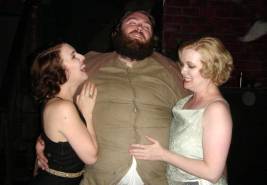 Considered one of Shakespeare’s screwballiest comic gems, The Merry Wives Of Windsor would seem to be made for a 1930s setting. The ‘30s were, after all, the decade that brought us It Happened One Night, Bringing Up Baby, The Awful Truth, and other screwball classics, a decade that once again allows The Porters’ resident costume designer Jessica Pasternak (director Charles’ mom) the opportunity to work her needle-and-thread magic on a shoestring budget. To further set the mood, the entire cast harmonizes to ‘30s song standards “Anything Goes” and “A Fine Romance“, in addition to 1867’s “(The Daring Young) Man on the Flying Trapeze” (not so incidentally the title of a 1935 W.C. Fields screwball flick).
Considered one of Shakespeare’s screwballiest comic gems, The Merry Wives Of Windsor would seem to be made for a 1930s setting. The ‘30s were, after all, the decade that brought us It Happened One Night, Bringing Up Baby, The Awful Truth, and other screwball classics, a decade that once again allows The Porters’ resident costume designer Jessica Pasternak (director Charles’ mom) the opportunity to work her needle-and-thread magic on a shoestring budget. To further set the mood, the entire cast harmonizes to ‘30s song standards “Anything Goes” and “A Fine Romance“, in addition to 1867’s “(The Daring Young) Man on the Flying Trapeze” (not so incidentally the title of a 1935 W.C. Fields screwball flick).
Not surprisingly, the plot concocted by Shakespeare for his large cast of characters is a convoluted one, featuring at its center Sir John Falstaff, the corpulent clown of Henry IV, parts 1 and 2, so beloved of Queen Elizabeth I that she commanded a play be written about “Falstaff In Love.”
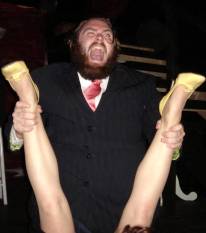 In actual fact, The Merry Wives Of Windsor’s Sir John (Dylan Vigus) seems more in lust than love, or perhaps it’s merely the bank accounts of Mistress Ford (Dana DeRuyck) and Mistress Page (Kate O’Toole) that have tickled Falstaff’s fancy.
In actual fact, The Merry Wives Of Windsor’s Sir John (Dylan Vigus) seems more in lust than love, or perhaps it’s merely the bank accounts of Mistress Ford (Dana DeRuyck) and Mistress Page (Kate O’Toole) that have tickled Falstaff’s fancy.
The plot begins to thicken when a pair of vengeful ex-servants—Pistol (Lamont Webb) and Nym (Lauren LoGrasso)—inform the ladies’ husbands Master Ford (Gus Krieger) and Master Page (Sean Faye) of Sir John’s schemes, prompting the former to disguise himself as “Master Brook,” the better to keep tabs on Falstaff.
Meanwhile, in another part of town, the Pages’ daughter Anne (Sasha Pasternak) is being wooed by Doctor Caius (Amir Levi), Master Slender (Timothy Portnoy), and Master Fenton (Michael Hoag), though Slender would seem to have the edge on the others, supported as he is by Master Page, Welsh parson Sir Hugh Evans (Leahy), and Mistress Quiclky (Eliza Kiss).
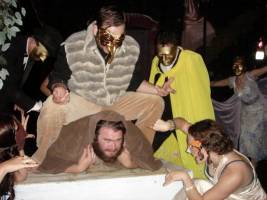 Pasternak’s ever imaginative direction emphasizes The Merry Wives’ ample slapstick elements—comedic swordplay, a fat man in a laundry basket, the selfsame fat man in drag, a chase or two, and a forest tussle between “Herne The Hunter” (again Falstaff in disguise) and a bunch of local children dressed as fairies. There are even two same sex weddings a full four centuries before they started becoming legal in our 21st Century world.
Pasternak’s ever imaginative direction emphasizes The Merry Wives’ ample slapstick elements—comedic swordplay, a fat man in a laundry basket, the selfsame fat man in drag, a chase or two, and a forest tussle between “Herne The Hunter” (again Falstaff in disguise) and a bunch of local children dressed as fairies. There are even two same sex weddings a full four centuries before they started becoming legal in our 21st Century world.
As for the ending, there’s no need to guess that after Much Ado About Nothing and quite A Comedy Of Errors, All’s Well That Ends Well for The Merry Wives Of Windsor.
A number of performances stand out, beginning with Vigus’s scene-stealing Falstaff, and though Falstaff’s overly small, overly tight costumes are the last thing from figure-flattering, it’s hard to imagine another young actor more right for the iconic role and more willing to take risk after risk in bringing him to irrepressible, over-the-top life.
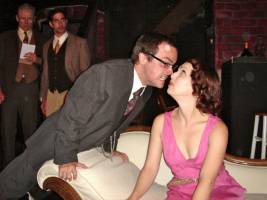 As Masters Ford and Brook, Krieger is every bit as unforgettable as he was in his Scenie-winning performance as The Merchant Of Venice. It might not even be going too far to refer to call Krieger a comic genius, and were he the only actor onstage, his performance alone would be worth the price of admission. (Krieger is also part of my very favorite gag, one inspired by Clark Kent’s transformation into Superman.)
As Masters Ford and Brook, Krieger is every bit as unforgettable as he was in his Scenie-winning performance as The Merchant Of Venice. It might not even be going too far to refer to call Krieger a comic genius, and were he the only actor onstage, his performance alone would be worth the price of admission. (Krieger is also part of my very favorite gag, one inspired by Clark Kent’s transformation into Superman.)
DeRuyck, Kiss, and O’Toole are three feisty and fabulous Mistresses; Faye, Portnoy, Leonard, and Hoag provide solid support; and both Leahy and Levi are standouts, with particular snaps due their (respective) Welsh and French accents. (I’m a sucker for silly French accents, and Levi’s is as supremely silly as they come.)
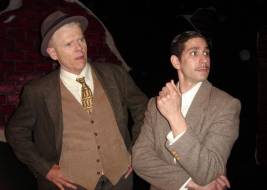 Overall, there are no weak links in Pasternak’s quite competent cast, one which is completed by Hillary Schwartz (Hostess) and Blanca Gomez as Robin. Hall, Levi, LoGrasso, and Webb appear in dual roles, Levi’s being particularly well-differentiated and memorable.
Overall, there are no weak links in Pasternak’s quite competent cast, one which is completed by Hillary Schwartz (Hostess) and Blanca Gomez as Robin. Hall, Levi, LoGrasso, and Webb appear in dual roles, Levi’s being particularly well-differentiated and memorable.
Scenic designers Taylor Fisher and Alex Parker have created a basic multipurpose blackbox set for The Porters’ latest, one which makes good use of the Whitmore-Lindley Theatre’s upstage staircases, with furniture and props (the latter by Nick Neidorf) differentiating clearly between the play’s numerous locales. (Cast members deserve an extra round of applause for facilitating quick scene changes.) Lighting by cast member Hall does the trick, with a particularly lovely forest effect in Act Two. Neidorf’s musical sound design adds to the 1930s setting with era-appropriate recordings and Fisher’s choreography contributes to the evening’s charm as well. Jesse James Thomas is assistant director.
As any avid L.A. theatergoer can tell you, there’s plenty of Shakespeare going on this summer (it wouldn’t be summer without the Bard), but none produced by a company as young and passionate and prolific as The Porters Of Hellsgate. You don’t have to be a Shakespeare fan to exit The Merry Wives Of Windsor quite merry indeed.
*plus three non-Shakespearean productions
Whitmore-Lindley Theater Center, 11006 Magnolia, North Hollywood.
www.portersofhellsgate.com
–Steven Stanley
June 22, 2012


 Since 2007, Steven Stanley's StageSceneLA.com has spotlighted the best in Southern California theater via reviews, interviews, and its annual StageSceneLA Scenies.
Since 2007, Steven Stanley's StageSceneLA.com has spotlighted the best in Southern California theater via reviews, interviews, and its annual StageSceneLA Scenies.







 COPYRIGHT 2025 STEVEN STANLEY :: DESIGN BY
COPYRIGHT 2025 STEVEN STANLEY :: DESIGN BY